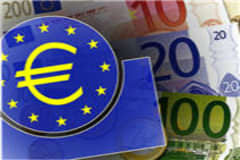
The euro was headed for its sharpest drop against the dollar in a month Thursday after comments from the European Central Bank chief and a downgrade to the region's growth and inflation forecasts boosted expectations of an interest rate cut.
Political chaos in Italy added to the euro's losses. Italian Prime Minister Mario Monti on Thursday faced a revolt by Silvio Berlusconi's PDL party, which ratcheted up tension ahead of an election early next year by walking out of a Senate confidence vote.
ECB President Mario Draghi, speaking at a news conference after the bank's decision to keep its main interest rate at 0.75 percent, said there was a wide discussion on interest rates, but the consensus was to leave the rates unchanged.
Political chaos in Italy added to the euro's losses. Italian Prime Minister Mario Monti on Thursday faced a revolt by Silvio Berlusconi's PDL party, which ratcheted up tension ahead of an election early next year by walking out of a Senate confidence vote.
ECB President Mario Draghi, speaking at a news conference after the bank's decision to keep its main interest rate at 0.75 percent, said there was a wide discussion on interest rates, but the consensus was to leave the rates unchanged.
"That comment suggests that there was a body of support for easing monetary policy, and so the market is looking to the next meeting as perhaps a time to seek a cut," said Andrew Wilkinson, chief economic strategist at Miller Tabak & Co. in New York.
The ECB sharply lowered its growth and inflation forecast for 2013 and said that risks to growth remain on the downside. The bank forecast gross domestic product in a range of falling by 0.9 percent to growing by just 0.3 percent next year, suggesting contraction is far more likely than not. It predicted inflation at 1.1 percent to 2.1 percent next year.
"The combination of the ECB's cooler growth and inflation forecasts opened the door to a rate cut in the months ahead," said Joe Manimbo, senior market analyst at Western Union Business Solutions in Washington.
Draghi also said the policymakers discussed setting a negative rate on the ECB's deposit facility in an attempt to encourage banks not to hoard cash at the ECB but lend it into the real economy instead.
The euro fell as low as $1.2976 and was last down 0.6 percent to $1.2984. At current levels, it was on track for the biggest daily percentage fall since Nov. 2.
Against the yen, the euro lost 0.8 percent to 106.94 yen.
Italian and Spanish government bond yields rose on tensions in Italy. A disappointing Spanish bond sale on Wednesday also weighed as it revived talk of an official bailout request from the euro zone's fourth-largest economy.
Draghi "completely ignored any questions regarding Italy, which is starting to worry the market," said Boris Schlossberg managing director of FX Strategy at BK Asset Management in New York. "Some analysts are predicting Italy could be contracting by as much as negative 3 percent next year. If that's the case, then they could become another financing crisis for the euro zone."
The dollar slipped 0.2 percent to 82.34 yen, still not far from an eight-month high of 82.82 yen hit on Nov. 22 on Reuters data.
Traders expect the yen to remain under pressure on expectations of further monetary easing by the Bank of Japan following an election on Dec. 16.
The Australian dollar rose 0.4 percent to a 2 1/2 month high of $1.0505, after surprisingly strong Australian jobs data prompted investors to reduce expectations of further policy easing
The ECB sharply lowered its growth and inflation forecast for 2013 and said that risks to growth remain on the downside. The bank forecast gross domestic product in a range of falling by 0.9 percent to growing by just 0.3 percent next year, suggesting contraction is far more likely than not. It predicted inflation at 1.1 percent to 2.1 percent next year.
"The combination of the ECB's cooler growth and inflation forecasts opened the door to a rate cut in the months ahead," said Joe Manimbo, senior market analyst at Western Union Business Solutions in Washington.
Draghi also said the policymakers discussed setting a negative rate on the ECB's deposit facility in an attempt to encourage banks not to hoard cash at the ECB but lend it into the real economy instead.
The euro fell as low as $1.2976 and was last down 0.6 percent to $1.2984. At current levels, it was on track for the biggest daily percentage fall since Nov. 2.
Against the yen, the euro lost 0.8 percent to 106.94 yen.
Italian and Spanish government bond yields rose on tensions in Italy. A disappointing Spanish bond sale on Wednesday also weighed as it revived talk of an official bailout request from the euro zone's fourth-largest economy.
Draghi "completely ignored any questions regarding Italy, which is starting to worry the market," said Boris Schlossberg managing director of FX Strategy at BK Asset Management in New York. "Some analysts are predicting Italy could be contracting by as much as negative 3 percent next year. If that's the case, then they could become another financing crisis for the euro zone."
The dollar slipped 0.2 percent to 82.34 yen, still not far from an eight-month high of 82.82 yen hit on Nov. 22 on Reuters data.
Traders expect the yen to remain under pressure on expectations of further monetary easing by the Bank of Japan following an election on Dec. 16.
The Australian dollar rose 0.4 percent to a 2 1/2 month high of $1.0505, after surprisingly strong Australian jobs data prompted investors to reduce expectations of further policy easing
No comments:
Post a Comment